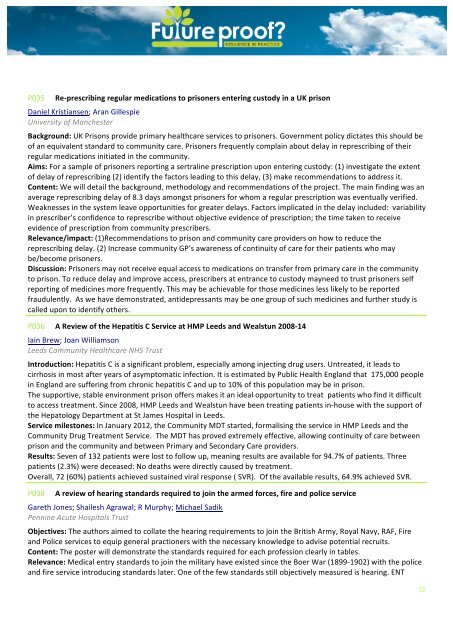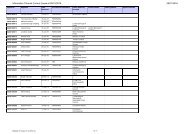RCGP-2014-poster-abstracts
RCGP-2014-poster-abstracts
RCGP-2014-poster-abstracts
Create successful ePaper yourself
Turn your PDF publications into a flip-book with our unique Google optimized e-Paper software.
P035 <br />
Re-‐prescribing regular medications to prisoners entering custody in a UK prison <br />
Daniel Kristiansen; Aran Gillespie <br />
University of Manchester <br />
Background: UK Prisons provide primary healthcare services to prisoners. Government policy dictates this should be <br />
of an equivalent standard to community care. Prisoners frequently complain about delay in represcribing of their <br />
regular medications initiated in the community. <br />
Aims: For a sample of prisoners reporting a sertraline prescription upon entering custody: (1) investigate the extent <br />
of delay of represcribing (2) identify the factors leading to this delay, (3) make recommendations to address it. <br />
Content: We will detail the background, methodology and recommendations of the project. The main finding was an <br />
average represcribing delay of 8.3 days amongst prisoners for whom a regular prescription was eventually verified. <br />
Weaknesses in the system leave opportunities for greater delays. Factors implicated in the delay included: variability <br />
in prescriber’s confidence to represcribe without objective evidence of prescription; the time taken to receive <br />
evidence of prescription from community prescribers. <br />
Relevance/impact: (1)Recommendations to prison and community care providers on how to reduce the <br />
represcribing delay. (2) Increase community GP’s awareness of continuity of care for their patients who may <br />
be/become prisoners. <br />
Discussion: Prisoners may not receive equal access to medications on transfer from primary care in the community <br />
to prison. To reduce delay and improve access, prescribers at entrance to custody mayneed to trust prisoners self <br />
reporting of medicines more frequently. This may be achievable for those medicines less likely to be reported <br />
fraudulently. As we have demonstrated, antidepressants may be one group of such medicines and further study is <br />
called upon to identify others. <br />
P036 <br />
A Review of the Hepatitis C Service at HMP Leeds and Wealstun 2008-‐14 <br />
Iain Brew; Joan Williamson <br />
Leeds Community Healthcare NHS Trust <br />
Introduction: Hepatitis C is a significant problem, especially among injecting drug users. Untreated, it leads to <br />
cirrhosis in most after years of asymptomatic infection. It is estimated by Public Health England that 175,000 people <br />
in England are suffering from chronic hepatitis C and up to 10% of this population may be in prison. <br />
The supportive, stable environment prison offers makes it an ideal opportunity to treat patients who find it difficult <br />
to access treatment. Since 2008, HMP Leeds and Wealstun have been treating patients in-‐house with the support of <br />
the Hepatology Department at St James Hospital in Leeds. <br />
Service milestones: In January 2012, the Community MDT started, formalising the service in HMP Leeds and the <br />
Community Drug Treatment Service. The MDT has proved extremely effective, allowing continuity of care between <br />
prison and the community and between Primary and Secondary Care providers. <br />
Results: Seven of 132 patients were lost to follow up, meaning results are available for 94.7% of patients. Three <br />
patients (2.3%) were deceased: No deaths were directly caused by treatment. <br />
Overall, 72 (60%) patients achieved sustained viral response ( SVR). Of the available results, 64.9% achieved SVR. <br />
P038 <br />
A review of hearing standards required to join the armed forces, fire and police service <br />
Gareth Jones; Shailesh Agrawal; R Murphy; Michael Sadik <br />
Pennine Acute Hospitals Trust <br />
Objectives: The authors aimed to collate the hearing requirements to join the British Army, Royal Navy, RAF, Fire <br />
and Police services to equip general practioners with the necessary knowledge to advise potential recruits. <br />
Content: The <strong>poster</strong> will demonstrate the standards required for each profession clearly in tables. <br />
Relevance: Medical entry standards to join the military have existed since the Boer War (1899-‐1902) with the police <br />
and fire service introducing standards later. One of the few standards still objectively measured is hearing. ENT <br />
32



